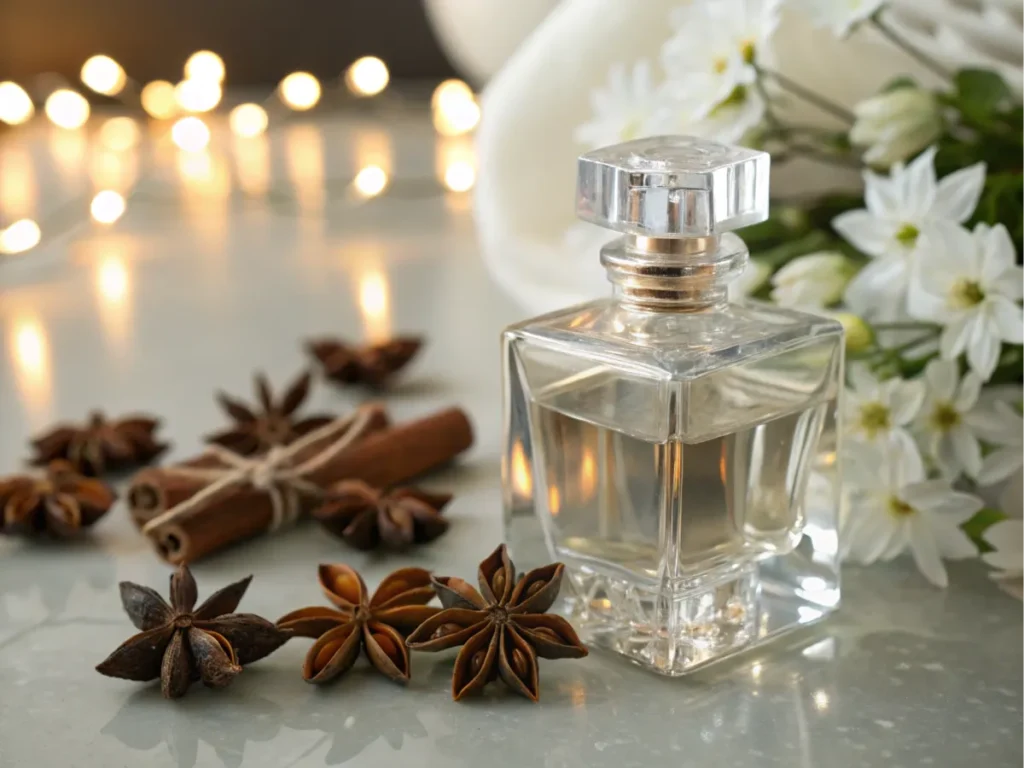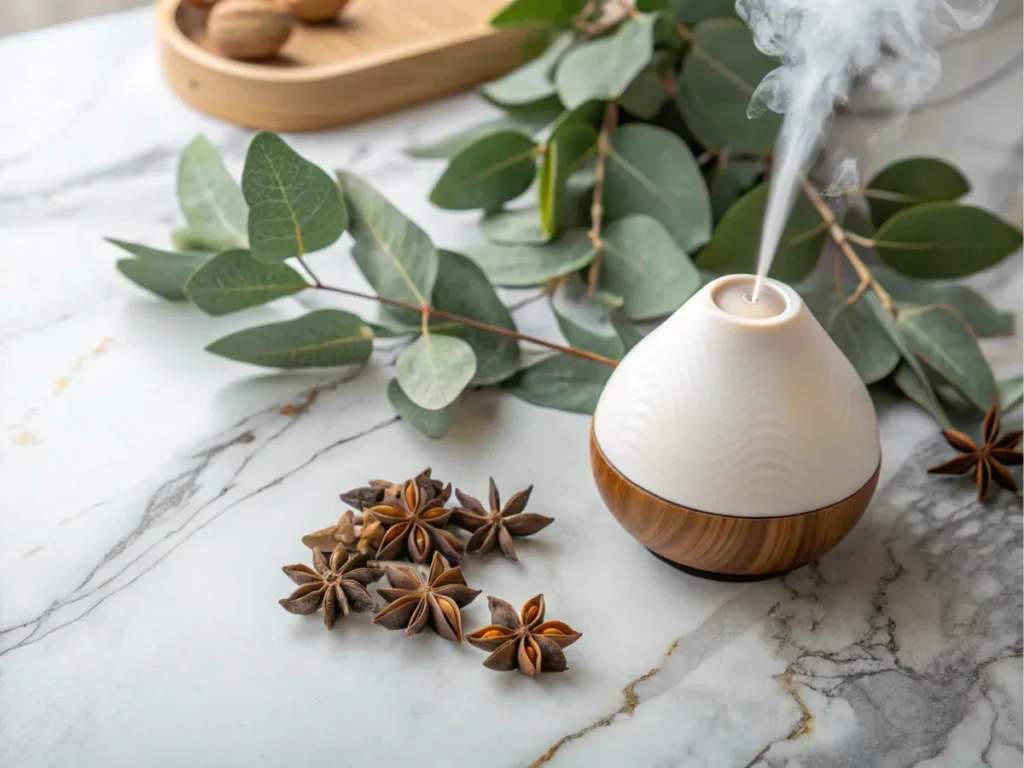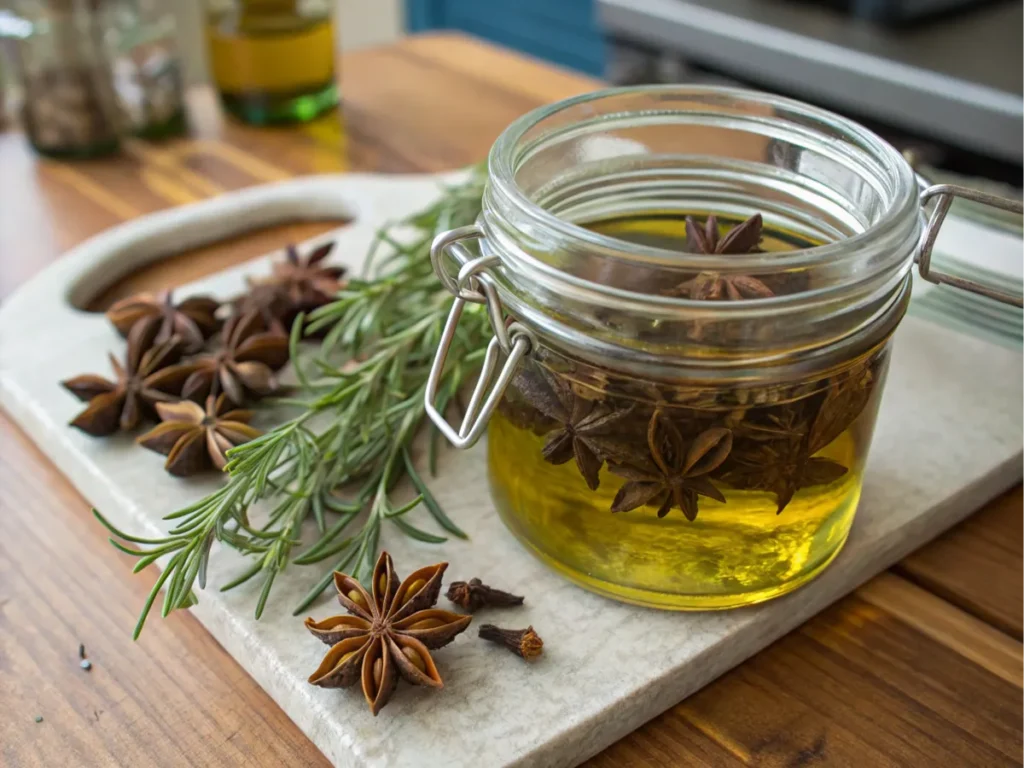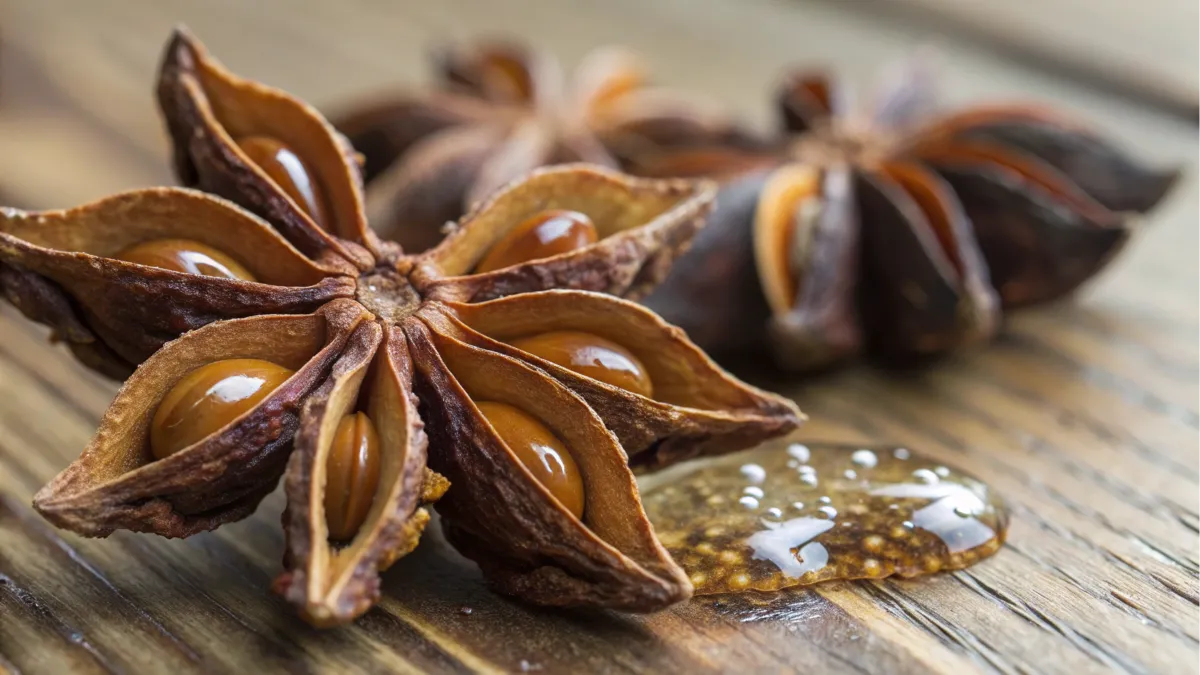Imagine stepping into a room filled with a warm, sweet, and spicy fragrance that captivates your senses. Consequently, this is the enchanting scent of anise oil. Known for its licorice-like aroma, anise oil undeniably fascinates people. Because of its distinctive smell, it soothes and energizes simultaneously. Therefore, it becomes a favorite in perfumes, recipes, and aromatherapy. Accordingly, this article explores the fascinating characteristics of anise oil, what makes its smell unique, and how it enhances various aspects of life.
Table of contents
The Aromatic Profile of Anise Oil
Anise oil, undoubtedly, possesses a bold yet comforting fragrance that immediately stands out. Additionally, its aroma blends sweetness, spice, and herbal freshness in a delicate balance. While it is often compared to fennel or licorice, it nevertheless maintains a unique scent all its own.
Why Does Anise Oil Smell So Special?
- Sweetness: The sweet undertones make it instantly recognizable and comforting. Many people associate it with childhood memories of licorice candy or desserts.
- Spicy Undertones: A gentle hint of spice adds warmth and depth, making the scent richer and more sophisticated.
- Herbal Freshness: A light herbal note balances the sweetness and spice, giving it a fresh and versatile aroma.
This combination of sweet, spicy, and fresh elements, undoubtedly, explains why anise oil is so beloved. Furthermore, its complex yet harmonious scent makes it ideal for use in perfumes, cooking, and wellness practices.
For creative ways to incorporate anise oil into your recipes, visit Anise Oil Uses and Recipes.
Chemical Components
Anise oil’s distinctive fragrance comes from its natural chemical composition. These compounds work together to create its unique smell and versatile properties.
Key Components
- Anethole: This is the primary compound in anise oil, making up 80-90% of its content. It gives the oil its signature licorice-like aroma and sweet flavor.
- Estragole: This adds a soft, floral quality to the scent, enhancing its complexity.
- Limonene: A fresh, citrusy compound that brightens the oil’s overall aroma.
Together, these elements create a fragrance that is rich, balanced, and highly versatile. Whether used in perfumes or recipes, anise oil’s unique chemical makeup ensures it stands out.
Common Uses
Anise oil’s versatility undoubtedly makes it a valuable addition to various areas of life. Furthermore, its distinct aroma and flavor allow it to shine in perfumes, cooking, and wellness practices.
In Perfumes
Anise oil, smell, is a staple in the perfume industry. Its sweet and spicy scent adds depth and warmth to a wide range of fragrances. It’s often used as a middle note, balancing lighter and heavier scents.
Why Perfumers Love Anise Oil
- Rich Layers: The combination of sweetness and spice creates a multi-dimensional aroma.
- Long-Lasting Fragrance: The scent lingers, making perfumes memorable and appealing.
- Blends Beautifully: It pairs well with other oils like vanilla, citrus, or lavender.
Anise oil’s ability to enhance both floral and citrus fragrances makes it a favorite among perfume creators. It adds a touch of mystery and warmth to any blend.
In Cooking
Anise oil’s licorice-like flavor makes it a popular ingredient in both sweet and savory dishes. Its unique taste and aroma can elevate recipes, giving them a memorable twist.
How Anise Oil Is Used in Food
- Baking: Anise oil is commonly used in cookies, cakes, and bread. Its sweet flavor complements desserts beautifully.
- Beverages: Drinks like absinthe, sambuca, and ouzo rely on anise oil for their signature flavors.
- Herbal Teas: A few drops of anise oil can transform a simple tea into a fragrant, soothing beverage.
| Ingredient | Amount | Notes |
|---|---|---|
| Star Anise Pods | 5 pieces | Substitute with fennel |
| Sugar | 1 cup | Adjust sweetness as needed |
| Water | 3 cups | For steeping |
Anise oil adds depth and character to recipes. Whether used sparingly or as a main flavor, it creates an unforgettable culinary experience.
Discover how other ingredients, like anise oil, enhance baked goods at What Does Kefir Do in Baking?.

In Aromatherapy
Anise oil is a favorite in aromatherapy for its calming and invigorating effects. Its sweet and spicy aroma creates a relaxing environment while also energizing the mind.
Benefits of Using Anise Oil in Aromatherapy
- Stress Relief: The sweet scent of anise oil helps reduce anxiety and promotes relaxation.
- Energy Boost: The spicy notes provide a subtle lift, making it perfect for staying alert during the day.
- Versatility: Anise oil can be used in diffusers, massage oils, or as a natural room spray.
This dual effect of calming and energizing makes anise oil ideal for creating a balanced and soothing atmosphere.

Why Anise Oil Is So Popular
Anise oil’s scent is its most appealing quality. Whether used to create luxurious perfumes, enhance flavorful dishes, or promote relaxation, its sweet and spicy aroma makes it special. Its ability to blend sweetness, warmth, and freshness sets it apart from other essential oils.
Pro Tips & Variations for Using Anise Oil
Anise oil is a multipurpose ingredient that can transform everyday experiences. Whether you’re cooking, crafting, or creating a relaxing space, its sweet and spicy aroma offers endless possibilities. Below are expert tips and creative ideas to help you make the most of this versatile oil.
How to Store Anise Oil for Long-Term Use
Proper storage, undoubtedly, is essential to preserve the quality and potency of anise oil. Furthermore, light, heat, and air exposure can degrade its anise oil, smell, and therapeutic properties over time. Accordingly, here’s how to ensure your anise oil remains effective:
- Choose the Right Bottle: Always store anise oil in dark glass containers. The dark glass protects the oil from light, which can weaken its aroma and quality.
- Keep It in a Cool Spot: Heat can change the oil’s composition and reduce its effectiveness. Store it in a cool, dry area away from stoves, radiators, or direct sunlight.
- Seal It Tight: Air exposure can cause the oil to lose its intensity. Always close the bottle tightly after each use to maintain its strength.
By following these steps, your anise oil can stay fresh and aromatic for months, if not longer. Proper storage not only extends its shelf life but also ensures you get the most out of its unique properties.
Learn how anise oil complements recipes with helpful tips from How to Cook Frozen Soup Dumplings.
Creative Uses of Anise Oil
Anise oil, undoubtedly, is perfect for experimenting. Moreover, its distinctive sweet and spicy scent pairs well with other flavors and fragrances, making it ideal for a wide range of applications. Accordingly, here are some creative ideas to inspire you.
In the Kitchen
- Savory Recipes: Use a small amount in soups, stews, or marinades for a subtle but surprising depth of flavor. It works especially well with hearty dishes.
- Baked Goods: Enhance cookies, cakes, or pastries with the warm, licorice-like aroma of anise oil. Its sweetness pairs beautifully with vanilla and cinnamon.
- Drinks: Add a drop to cocktails, mocktails, or herbal teas for a sophisticated, aromatic twist.
Anise oil’s strong flavor means a little goes a long way. Start with a tiny amount and adjust to taste.
In Home Fragrance
- Candles: Create homemade candles by adding a few drops of anise oil to melted wax. The resulting scent is sweet, inviting, and perfect for creating a cozy ambiance.
- Room Sprays: Mix anise oil with distilled water and a few drops of lavender or lemon oil for a natural, calming room spray. It’s perfect for freshening up living spaces.
- Diffusers: Combine anise oil with citrus or floral essential oils in a diffuser to fill your home with a warm and uplifting aroma.
In Wellness Products
- Massage Oils: Mix anise oil with a carrier oil like almond or coconut for a soothing and aromatic massage blend.
- Aromatherapy Blends: Combine with oils like orange or bergamot for a balanced and energizing diffuser blend.
- Bath Soaks: Add a few drops to bathwater for a relaxing soak that relieves stress and soothes the senses.
These ideas demonstrate how versatile anise oil can be. Whether you’re crafting, cooking, or relaxing, its unique aroma enhances every experience.

FAQs: Everything You Need to Know About Anise Oil
Anise oil is loved for its strong scent and unique properties. Below are answers to common questions that can help you better understand its uses and benefits.
What Does Anise Oil Smell Like?
Anise oil smells sweet, warm, and slightly spicy. It is often compared to licorice candy because of its strong, recognizable aroma. This unique scent makes it a favorite for perfumes, cooking, and aromatherapy.
Does Anise Smell Like Licorice?
Yes, anise oil and licorice have a similar smell because they both contain a compound called anethole. This shared ingredient gives them their signature sweet and licorice-like aroma.

What Does Anise Smell Like in Perfume?
In perfumes, anise oil adds depth and complexity. It is used as a middle note, balancing floral or citrus top notes and woody or vanilla base notes. This versatility makes it a popular choice for creating unique, layered fragrances.
What Does Anise Oil Attract?
Anise oil’s sweet scent is known to attract pollinators like bees. Historically, it has also been used to lure certain animals, highlighting its appeal in natural settings. Its bold aroma can enhance outdoor spaces or be used in wildlife-friendly gardens.
How Anise Oil Enhances Everyday Life
Anise oil’s versatility extends to various aspects of daily living. Here are practical ways to include it in your routine:
- Cooking Tip: Add a drop of anise oil to baked goods like biscotti or gingerbread cookies for a festive twist.
- Aromatherapy Tip: Use it in a diffuser during work hours to promote focus and relaxation simultaneously.
- Fragrance Tip: Combine it with vanilla oil for a warm, sweet perfume perfect for cooler months.
These small but effective tips can help you enjoy anise oil’s benefits every day.

Conclusion
Anise oil is a fragrant and versatile essential oil that, undoubtedly, offers countless benefits. Furthermore, its sweet and spicy aroma makes it ideal for perfumes, recipes, and wellness. By learning how to store and use it properly, you can, therefore, enjoy its full potential in cooking, home fragrance, and relaxation routines. Discover creative ways to incorporate it into your recipes with ideas from Anise Oil Uses and Recipes. Whether you’re a seasoned user or trying it for the first time, anise oil is a powerful addition to any lifestyle. For tips on handling anise oil in culinary creations,

